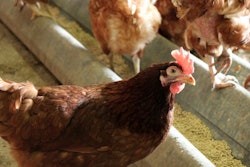
Legislators in Rhode Island are considering a bill that would make it unlawful to use cages in egg production, as well as sow gestation stalls and veal crates.
House Bill 7456 was introduced in February by Reps. Patricia Serpa, Evan Shanley, Joseph Solomon Jr., Daniel McKiernan and William O’Brien, all Democrats.
The bill seeks to make battery cages, enriched cages and colony cages unlawful. The bill does have exceptions, stating that confinement would be allowed for veterinary purposes, during transportation, during exhibitions or for educational purposes, or for temporary animal husbandry purposes that would not exceed six hours.
Under the legislation, a violation of the conditions set forth in the bill would be punishable by a fine ranging from $50 to $500.
If the bill were to become law, the statute would take effect on January 1, 2023.
Hearing for bill
Rhode Island’s House Committee on the Environment and Natural Resources held a hearing on the bill on April 5. Among those to testify, according to EcoRI, was Eli Berkowitz, owner of Little Rhody Farms. It is the state’s largest egg farm, housing 44,000 hens.
Berkowitz testified that hens are more content when in cages, versus being on the floor. Caged hens are more productive, laying more eggs, Berkowitz said, and Salmonella incidences are fewer in a caged environment.
Also testifying was Diane Sullivan, an advocate for low-income families who contested a similar bill in her home state of Massachusetts. Sullivan argued that the costs of cage-free egg production are higher than those related to conventional egg production, and those costs are passed on to consumers. She described the bill as “a hidden regulatory tax on animal protein that contributes to the gentrification of our food.”
The bill has been held for further study. The Rhode Island Senate has yet to conduct a hearing related to the matter.


















